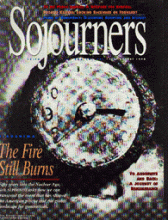A NETWORK FOR RENEWAL
On May 18, after the Christian Coalition released its Contract With the American Family, NPR's Alex Chadwick asked the executive director of the Christian Coalition, Ralph Reed, what his organization hoped to accomplish over the next five to 10 years. Reed replied,
"What we aspire to be is a permanent fixture on the American political landscape for people of faith, just as the Chamber of Commerce is for business, or just as the AFL-CIO is for union workers, or just as the Veterans of Foreign Wars are for veterans."
Then Reed defined what he meant by "people of faith" as "those with devout faith, those who have sought to elevate a sense of civility and a sense of values in our society, those who attend church or synagogue and who testify to a religious commitment." That's a pretty big group. It represents most people I know. Reed says he desires to give us all a "voice in government." The problem is that many people who fall into Mr. Reed's definition of "people of faith" don't want to be politically represented by the Christian Coalition or the Religious Right.
Out of that concern, a network representing alternative voices to the Religious Right began to form several months ago. More than 100 Christian leaders from a diversity of traditions joined in a call titled "The Cry for Renewal" that sends a clear message to the nation's media and political leaders: Let other voices be heard.
On Tuesday, May 23, a delegation representing that broad group gathered in Washington, D.C., to meet with the press and the political leadership of both the Democratic and Republican parties. The group was led by evangelical Christian leaders to correct the media-created public impression of a monolithic right-wing evangelical juggernaut. There was a wonderful and complementary unity in our voices, and together the message was very clear.
Read the Full Article
